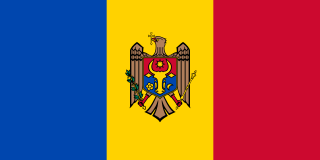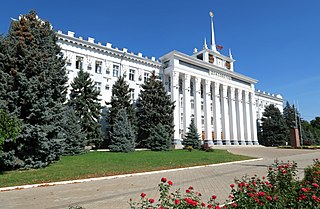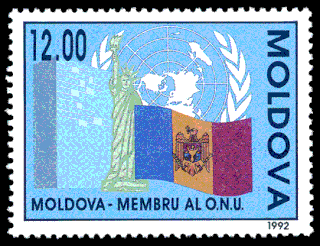The history of Moldova can be traced to the 1350s, when the Principality of Moldavia, the medieval precursor of modern Moldova and Romania, was founded. The principality was a vassal of the Ottoman Empire from 1538 until the 19th century. In 1812, following one of several Russian–Turkish wars, the eastern half of the principality, Bessarabia, was annexed by the Russian Empire. In 1918, Bessarabia briefly became independent as the Moldavian Democratic Republic and, following the decision of the Parliament, united with Romania. During the Second World War it was occupied by the Soviet Union which reclaimed it from Romania. It joined the Union as the Moldavian ASSR, until the dissolution of the USSR. In 1991 the country declared independence as the Republic of Moldova.

The politics of Moldova take place in a framework of a parliamentary representative democratic republic, wherein the prime minister is the head of the Government of Moldova, and a multi-party system. The President of Moldova has no important powers. The government exercises executive power while the legislative power is vested in the Parliament. The judiciary is independent of the executive and the legislature. The position of the breakaway region of Transnistria, relations with Romania and with Russia, and integration into the EU dominate political discussions.

Moldova, officially the Republic of Moldova, is a landlocked country in Eastern Europe, on the northeastern corner of the Balkans. The country spans a total of 33,483 km2 and has a population of approximately 2.5 million as of January 2023. Moldova is bordered by Romania to the west and Ukraine to the north, east, and south. The unrecognised breakaway state of Transnistria lies across the Dniester river on the country's eastern border with Ukraine. Moldova is a unitary parliamentary representative democratic republic with its capital in Chișinău, the country's largest city and main cultural and commercial centre.

Tiraspol is the capital and largest city of Transnistria, a breakaway state of Moldova, where it is the third largest city. The city is located on the eastern bank of the Dniester River. Tiraspol is a regional hub of light industry, such as furniture and electrical goods production.

Transnistria or Pridnestrovie, officially known as the Pridnestrovian Moldovan Republic (PMR), is an internationally unrecognized state, considered to be a part of Moldova. Transnistria controls most of the narrow strip of land between the Dniester river and the Moldova–Ukraine border, as well as some land on the other side of the river's bank. Its capital and largest city is Tiraspol. Transnistria is officially designated by the Republic of Moldova as the Administrative-Territorial Units of the Left Bank of the Dniester or as Stînga Nistrului. In March 2022, the Parliamentary Assembly of the Council of Europe adopted a resolution that defines the territory as under military occupation by Russia.

Vladimir Voronin is a Moldovan politician. He was the third President of Moldova from 2001 until 2009 and has been the leader of the Party of Communists of Moldova (PCRM) since 1994. He was Europe's first democratically elected communist party head of state after the dissolution of the Eastern Bloc.

The politics of Transnistria, a de facto independent state situated de jure within the Republic of Moldova in Eastern Europe, take place in a framework of a semi-presidential republic, whereby the President of Transnistria is head of state and the Prime Minister of Transnistria is head of government. Executive power is exercised by the government. Legislative power is vested in both the government and parliament. Formally, Transnistria has a multi-party system and a unicameral parliament, called the Supreme Council. The president is elected by popular vote. The latest parliamentary elections were held in December 2010; however, they were not monitored by international organizations such as Organization for Security and Co-operation in Europe (OSCE), which has expressed doubts about the level of democracy in the region, and were not recognized by other countries.

Obnovlenie, officially the Republican Party "Obnovlenie", is a political party in the unrecognized state of Transnistria, an entity that is internationally recognized as part of Moldova. It has been the parliamentary majority in the Supreme Council since 2005.
Aleksandr Radchenko was an ethnic Ukrainian politician and human rights activist from Transnistria. A former Soviet military officer, he was the editor of a small opposition newspaper in Tiraspol called Chelovek i ego prava. Most of his articles deal with human rights issues.
The Liberal Democratic Party of Transnistria is a nationalist and right-wing populist political party in the breakaway state of Transnistria, recognized as part of Moldova. It was formed on 1 August 2006 by followers of Vladimir Zhirinovsky and is affiliated with the Liberal Democratic Party of Russia. The party leader is Transnistrian politician Valerly Kulakli.
The mass media of Transnistria, the breakaway territory within the borders of Moldova, features both state-owned or supported outlets and opposition media. Publications are in Russian, with a single newspaper in each of the other two official languages, Moldovan (Romanian), and Ukrainian.

Romanian nationalism is the nationalism which asserts that Romanians are a nation and promotes the cultural unity of Romanians. Its extremist variation is Romanian ultranationalism.

The Government of Pridnestrovian Moldavian Republic is the political leadership of the unrecognized, but de facto independent, Pridnestrovian Moldavian Republic, better known in English as Transnistria.

The following is timeline of the History of independent Moldova which started after the independence of Moldova.

Anatol Țăranu is a Moldovan politician.

International recognition of Transnistria – a disputed region in Eastern Europe located between Moldova and Ukraine – is controversial. Although Transnistria declared independence in 1990, no United Nations member recognises its sovereignty and the region is considered by the UN to be part of Moldova. Currently, only Abkhazia and South Ossetia recognise its independence, both states with limited recognition themselves. Despite not officially recognizing Transnistria's independence, Russia has close relations with Transnistria and even established a consulate in the territory. The Council of Europe considers the region a Russian-occupied territory.

The government of Transnistria, a breakaway state internationally recognized as part of Moldova, has requested annexation by Russia numerous times. Transnistria is a territory that separated itself from Moldova due to fear of a possible unification of the latter with Romania. This sparked the Transnistria War, in which Russian-backed Transnistria managed to stay separate from Moldova. Despite this, today Transnistria is legally and internationally considered part of Moldova.

Since the outbreak of the Transnistria conflict, there have been efforts and proposals to reincorporate the unrecognized state of Transnistria into Moldova.













